

Depression 'second leading cause of disability worldwide' New Mouse Study Links Chronic Stress to Depression, Adds Evidence to the Benefits of Antidepressants. Can chronic stress cause depression?
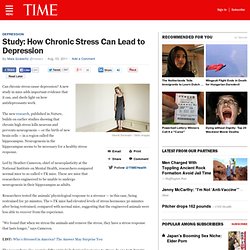
A new study in mice adds important evidence that it can, and sheds light on how antidepressants work. The new research, published in Nature, builds on earlier studies showing that chronic high stress kills neurons and prevents neurogenesis — or the birth of new brain cells — in a region called the hippocampus. Neurogenesis in the hippocampus seems to be necessary for a healthy stress response. Led by Heather Cameron, chief of neuroplasticity at the National Institute on Mental Health, researchers compared normal mice to so-called v-TK mice. These are mice that researchers engineered to be unable to undergo neurogenesis in their hippocampus as adults.
Researchers tested the animals’ physiological response to a stressor — in this case, being restrained for 30 minutes. “We found that when we stress the animals and remove the stress, they have a stress response that lasts longer,” says Cameron. LIST: Who’s Stressed in America? Tianeptine. Brain Zaps, Brain Shivers, Point of Return.com. In the late 1700s, an Italian anatomist named Luigi Galvani discovered evidence of a bioelectric force within living tissues.
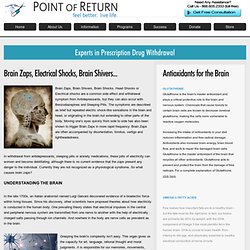
Since his discovery, other scientists have proposed theories about how electricity is conducted in the human body. One prevailing theory states that electrical impulses in the central and peripheral nervous system are transmitted from one nerve to another with the help of electrically charged salts passing through ion channels. And nowhere in the body are nerve cells as prevalent as in the brain. Grasping the brain's complexity isn't easy.
This organ gives us the capacity for art, language, rational thought and moral judgments. The brain is a 3-pound (1.4 kilogram) mass of fat and protein that has the appearance of a small cauliflower. To compound the intricacy, each of these 100 billion nerve cells make 10,000 connections with other nerve cells, so ensuring these nerves remain in balance is critical. According to Dr. Back to Education. Brain Zaps, Brain Shivers, Point of Return.com. The case against spanking. A growing body of research has shown that spanking and other forms of physical discipline can pose serious risks to children, but many parents aren’t hearing the message.
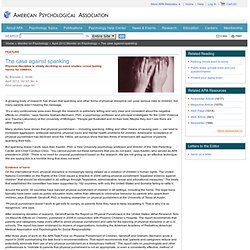
“It’s a very controversial area even though the research is extremely telling and very clear and consistent about the negative effects on children,” says Sandra Graham-Bermann, PhD, a psychology professor and principal investigator for the Child Violence and Trauma Laboratory at the University of Michigan. “People get frustrated and hit their kids. Maybe they don’t see there are other options.” Many studies have shown that physical punishment — including spanking, hitting and other means of causing pain — can lead to increased aggression, antisocial behavior, physical injury and mental health problems for children. Americans’ acceptance of physical punishment has declined since the 1960s, yet surveys show that two-thirds of Americans still approve of parents spanking their kids.
Evidence of harm Research findings. What Spanking Really Teaches. By Darlene Barriere - Webmaster (Kamloops, British Columbia, Canada) [ADOPTED from August 2007 issue Barriere Bits E-zine] The vast majority believe it is their right to spank their child as a form of discipline.
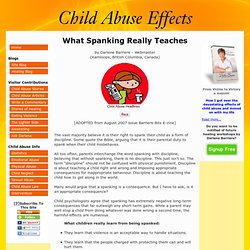
Some quote the Bible, arguing that it is their parental duty to spank when their child misbehaves. All too often, parents interchange the word spanking with discipline, believing that without spanking, there is no discipline. This just isn't so. Many would argue that a spanking is a consequence. Child psychologists agree that spanking has extremely negative long-term consequences that far outweigh any short-term gains. What children really learn from being spanked:They learn that violence is an acceptable way to handle situations.They learn that the people charged with protecting them can and will hurt them.They learn that love = pain. Tickling - Good Clean Fun - Or Abuse? Probably everyone in America has been tickled and/or has tickled someone else in his or her lifetime.
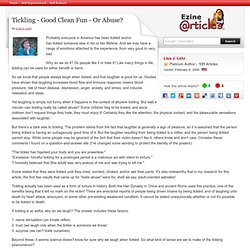
And we may have a range of emotions attached to the experience, from very good to very bad. Why do we do it? Do people like it or hate it? Like many things in life, tickling can be used for either benefit or harm. So we know that people always laugh when tickled, and that laughter is good for us. Yet laughing is simply not funny when it happens in the context of abusive tickling. But there's a dark side to tickling. Examining the association between adult attachment style and cortisol responses to acute stress. Love and Work An Attachment-Theoretical Perspective. Author: Hazan, Cindy; Shaver, Phillip R.
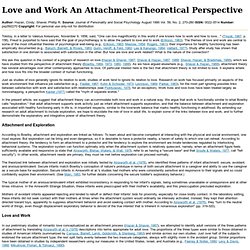
Source: August 1990 Vol. 59, No. 2, 270-280 ISSN: 0022-3514 Number: psp592270 Copyright: For personal use only-not for distribution Tolstoy, in a letter to Valerya Aresenyev, , said, "One can live magnificently in this world if one knows how to work and how to love…" (Troyat, 1967, p. 158). Freud is purported to have said that the goal of psychotherapy is to allow the patient to love and to work (Erikson, 1963).